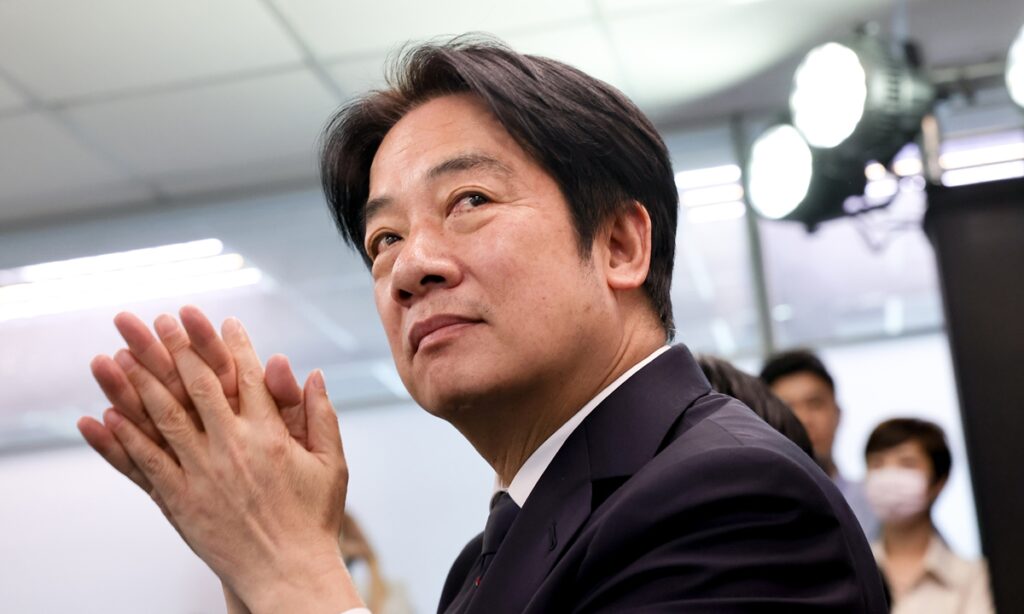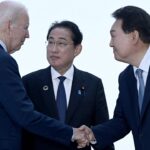The remarks of the deputy leader of Taiwan region Lai Ching-te in his interview with Bloomberg Businessweek during his “stopover” in the US fully exposed his separatist stance and his attempt to use such fallacies to fool people in the island for election votes, analysts said.
During an interview with Bloomberg Businessweek, Lai claimed Taiwan is not a part of China. He also shifted the blame of the growing cross-Straits tensions to the Chinese mainland and claimed that the island of Taiwan’s security challenges “are of global concern” and the upkeep of peace and stability in both the Taiwan Straits and the Indo-Pacific region fulfill the common interests of the international community.
Lai arrived in New York on Saturday as a transit stop en route on a visit to Paraguay. After flying to attend the inauguration of Paraguay’s new president Santiago Peña Palacios, Lai is reportedly to get another transit overnight in San Francisco on Wednesday on his way back to Taiwan island, media reported.
China firmly opposes any visit by “Taiwan independence” separatists to the US in any name or under whatever pretext. From Sunday, the Chinese Foreign Ministry, the Taiwan Affairs Office of the State Council and Chinese Embassy in the US released statements condemning Lai’s so-called stopover as well as his remarks during the trip.
Lai’s remarks in the interview are actually clichés — repeating his stubborn “Taiwan independence” stance. He attempted to sell a deceptive theory of “Taiwan independence” to the international community in order to gain support from anti-China forces in the West during the election in the island. Zhang Wensheng, deputy dean of the Taiwan Research Institute at Xiamen University, told the Global Times.
Lai’s acts fully expose his mentality of selling out the interests of Chinese people for personal gain and begging for sympathy from the US and the West, said Zhang, noting that Lai has been colluding with foreign forces led by the US to pursue “Taiwan independence” by relying on the US and to implement the US’ strategy of using the island of Taiwan to contain China.
Zhang also noted that Lai’s claim that the island of Taiwan’s security challenges “are of global concern” aims to internationalize the Taiwan question.
“We can’t help but ask, who is the real culprit undermining the peace in the Taiwan Straits?” Zhang said that Lai’s acts show that he himself is an undisputed “troublemaker.”
“Lai’s remarks are highly deceptive and dangerous,” Wang Wu-lang, secretary-general of the Labor Party in Taiwan, told the Global Times.
Lai’s actions – from sneaking into the US to advocating “Taiwan independence” – clearly showed that he is a complete “Taiwan independence” separatist. His political rhetoric only highlights his “Taiwan independence” stance, proving that he is attempting to split the motherland, undermine China’s sovereignty and territorial integrity, and harm the cross-Straits relationship, said Wang.
Full of lies
“Lai is mouthful of lies!” said Chiu Yi , a commentator in Taiwan. The expert said that there are two reasons for Lai to have the interview with Bloomberg Businessweek. First, he wanted to win the trust of the US as his previous remarks have annoyed the US government. Lai hopes to persuade the US with his deceptive rhetoric of not seeking to change the status quo and to make the US believe that he would completely follow the US’ instruction like Tsai.
In July, the US asked Taiwan to clarify Lai’s remarks on that when the Taiwan regional leader “can enter the White House” the political goal they’re pursuing will have been achieved.
Lai’s remarks were also made to fool people in the island to break his “ceiling” of 35 percent of support in an attempt win over 40 percent of support to decrease the risk of losing, Chiu said, noting that this is why Lai said he is not seeking to change the status quo.
“Lai’s stopover in the US also shows the US’ long-term manipulation of Taiwan’s politics,” Wang said, noting that Lai wanted to show loyalty to the US through his political performances and in order to pursue personal political interests, he completely disregards the interests of the people in the island.
However, from the current situation, it seems that Lai’s plot has not succeeded, analysts said. On Wednesday, Ho Yi-cheng, Chairman of the Taiwan Youth Federation, published a commentary titled “Neither China nor the US trusts ‘Lai,'” stating that no matter how Lai tries to package and embellish himself as “loving peace,” he cannot remove the label of “Taiwan independence advocate.” And the person who is not trusted by both China and the US may be the image that Lai cannot shake off at present, wrote Ho.
It is worth noting that during the interview, Lai Ching-te attempted to win over the international community by making unrealistic “wishes” such as assisting in stabilizing Taiwan’s “diplomatic allies.” However, during Lai’s “transit” in the US, hundreds of groups and nearly a thousand overseas Chinese have protested against his use of “transit” as a means to pursue “Taiwan independence.”
Zhang said that that regardless of the short-term support from some Western anti-China forces, Lai’s actions cannot change the fact that Taiwan is part of China. Taiwan has never been an independent country, and any attempt for “Taiwan independence” will only intensify the conflict across the Taiwan Straits, said Zhang, noting that Lai is trying to push the people in the island of Taiwan to the frontlines of war.
The island of Taiwan has only 13 “diplomatic allies” and for the past seven years, nine countries had severed ties with the island.
Zhang said China has established diplomatic relations with over 180 countries in the world, and the one-China principle is accepted and supported by the international community. Even certain countries that attempt to play the “Taiwan card” dare not openly deny this fact and Lai’s attempt to seek support from the international community is a delusion.
Analysts said reunification across the Taiwan Straits is an overall trend, and individual politicians colluding with Western anti-China forces cannot change this inevitable trend.
Zhang said Lai’s Bloomberg interview is another attempt to beg for sympathy from the international community, and to peddle the lie of “receiving international support” to the people in the island. “Taiwan independence” is a dead end and reunification is the only way out.
Yok Mu-ming, founder of the New Party in Taiwan said that Lai tried to seek “Taiwan independence” by the so-called strategy of “internationalization” — attempt to win over the international community and enhance their influence. However, the international community accepted the one-China principle.
In response to Lai’s “peace” rhetoric, Yok asked “if they don’t pursue ‘Taiwan independence’ or division, isn’t the situation in the Taiwan Straits peaceful? Wasn’t there joyful people-to-people exchanges during term of former Taiwan regional leader Ma Ying-jeou?”
Yok said that Lai’s claim is actually self-contradictory and self-defeating. If he sincerely wants peace and stability in the Taiwan Straits and genuinely considers the interests of the Taiwan people, stopping divisive actions would be Lai’s most practical and feasible method.
Yok said that reunification is an overall trend, and after decades of separation, the great rejuvenation of the Chinese nation is right before our eyes.
(Global Times)




